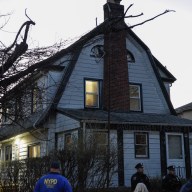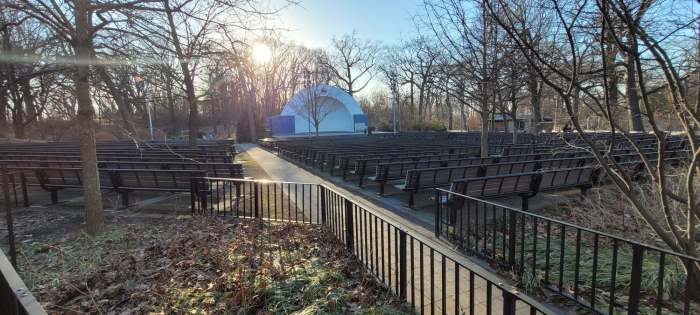By Kathianne Boniello
Max Boswell was 5 years old in 1996 when he fell down and bumped his head while attending school at Bayside’s PS 41.
That summer the once bright and enthusiastic boy became withdrawn and slow to respond when spoken to while attending summer camp at the nearby Bayside YMCA, his father Steven said. At one point, Boswell said, Max walked into a wall, complaining that he could not see it.
“I just thought he was a little bit accident-prone,” Boswell recalled in a recent interview about the weeks before his son’s condition dramatically worsened. “He was still absolutely OK. He loved Dr. Seuss, Winnie the Pooh. He learned to read and he was so proud of himself.
“He was just so proud,” Boswell , 52, repeated, his voice trailing off.
About six months later Max Boswell was immobile, having lost the ability to walk, speak or communicate, according to his father, who for much of the time had no idea what was causing his son’s distress.
It was not until December 1996 when Boswell knew what had happened to Max. An MRI showed that the child has a rare genetic disorder called adrenoleukodystrophy, or ALD — a condition which is passed from mother to son and only affects boys.
Now 10, Max is a patient at St. Mary’s Hospital for Children in Bayside and the Boswell has launched a campaign to raise awareness about ALD and funds for research into the disease.
“It’s progress is so frightening that you can’t fathom how destructive it can be,” Boswell said. “For something that is so nasty — people should know about it.”
According to the Pittsburgh-based Adrenoleukodystrophy Foundation, the disease involves the destruction of a brain substance known as myelin, which acts as insulation for nerves. The destruction of myelin also occurs in diseases such as multiple sclerosis.
Once the myelin is stripped away, nerve cells are destroyed, causing a rapid deterioration in a victim’s ability to see, hear, walk, and move, according to the foundation’s Web site, www.aldfoundation.org. The condition, when in full bloom, is irreversible, but if potential victims are identified early enough, Boswell said, treatments can be used to slow the progress of ALD.
ALD was featured in the 1992 Nick Nolte-Susan Sarandon movie “Lorenzo’s Oil,” a true story about the struggle of a Maryland couple, Augusto and Michaela Odone, to find a treatment for their ALD-afflicted son, Lorenzo. But despite the movie, Boswell said too many people are ignorant about the disease.
“I really want to make a difference,” he said. “It’s not going to bring Max back, but there is something I can do.”
The problem with the movie, said Boswell, who saw the film after Max was diagnosed with ALD, is that people think the oil developed by the Odones is a cure for the disease.
“I saw the movie ‘Lorenzo’s Oil,’” said Boswell, who said Max has been taking Lorenzo’s Oil for about four years. “Once the symptoms are present, it doesn’t reverse it. The payoff was definitely not there.”
Lorenzo’s Oil, made of a combination of rapeseed oil and olive oil extracts, is believed to work by attacking fatty acids in the brain thought to cause the myelin destruction, according to The Myelin Project, a group started by the Odones to fund scientific research into myelin restoration. It is believed, according to The Myelin Project web site www.myelin.org, that Lorenzo’s Oil can prevent the disease from progressing if victims take it before symptoms occur.
Boswell said if more people are aware of ALD’s signs and symptoms or if a screening test could be developed to test boys for the genetic signs of ALD, Lorenzo’s Oil could be administered.
“I want to get the word out so that people know how horrible it is,” he said.
The Bayside man contends that if medical personnel at North Shore University Hospital, who saw Max, or if school teachers or other people who work with children were more aware of ALD, he could have saved weeks or months with his son.
“He was on an express train going downhill,” Boswell said.
Now as Boswell kicks off his awareness campaign, he said he is grateful for the facilities offered by St. Mary’s, where Max, who will turn 11 in December, still lives.
“I’m lucky that I have a hospital like St. Mary’s just up the boulevard,” he said. “But there are a lot of people who are still trying to take care of these kids at home.”
“I would like potential parents to know if you suspect anything, if you think your child might be at risk, get it tested, try to prevent it,” he said.
The work will be worth it, Boswell said, “if it’s possible to give some kid his life back.”
Contact Steven Boswell by e-mail at schasbo@msn.com, or the United Leukodystrophy Foundation, a nonprofit Illinois-based parents group by phone at 1-800-728-5483 or on-line at www.ulf.org.
Reach reporter Kathianne Boniello by e-mail at Timesledger@aol.com or call 229-0300, Ext. 157.































